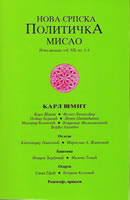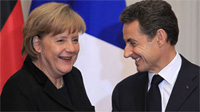| NSPM in English | |||
Germany, France and the euro |
 |
 |
 |
| уторак, 06. децембар 2011. | |
|
(Economist, Dec 5th 2011, by Charlemagne | BRUSSELS)
That deal envisaged tougher monitoring of countries’ budgets and economic policies, and a rapid amendment to the European Union's treaties. Many thought treaty change was unnecessary but went along for Mrs Merkel's sake. Sounds familiar, no? That is because, a year on, “Merkozy”, as the Germano-French duo are now known, are once again pushing for a toughening-up of controls on national budgets and yet another revision to the treaties. At a summit in Paris today the two leaders announced they would “force-march” the euro zone towards stricter rules to ensure that a debt crisis could never happen again. They will submit proposals for a new treaty on Wednesday and, if they cannot secure agreement from all 27 EU members, they declared they were ready to push ahead with a separate agreement among the 17 members of the euro zone. That risks isolating Britain, as well as the nine other non-euro states. Treaty change is no more popular than it was in Deauville, not even among euro-zone members. But at a summit of European leaders in Brussels starting on Thursday the chances are that some form of treaty revision will grudgingly be agreed, because Mrs Merkel wants it so badly. But in many ways, the new proposals undo the bargain at Deauville, which, many think, helped worsen the crisis. Since then Ireland and Portugal have been bailed out; Greece has sought a second rescue programme; contagion has spread to Italy and Spain; and the prime ministers of Italy and Greece have been replaced by technocrats. A year ago, the Deauville bargain saw Germany agree to water down proposals to impose more “automatic” sanctions on countries that breach rules on public debt and budget deficits. France insisted on maintaining greater discretion for governments (though it later had to give some ground to the European Parliament). In exchange, France agreed to a limited treaty change to turn the temporary bail-out fund, the European Financial Stability Facility (EFSF), into a permanent mechanism known as the European Stability Mechanism (ESM). One provision, that the most persistent offenders should lose their voting rights, was soon abandoned. But a second one, seeking the “adequate participation” of private bondholders, survived. At first haircuts were supposed to apply only to new debt issued from 2013, when the ESM was due to come into force. But this year the euro zone twice demanded that private creditors take losses on existing Greek debt. For many critics—notably Jean-Claude Trichet, the recently departed president of the European Central Bank—this private-sector involvement (PSI, in Euro-jargon) badly spooked the markets about the value of the European debt they were holding. France and Germany will not accept that they made a mistake in Deauville. But look at their latest deal and it is clear that they have had second thoughts: France has agreed with German demands for even greater "automaticity" in the process leading to sanctions; and Germany, in return, has agreed to weaken the articles on restructuring the debt held by private creditors. The PSI provisions had been written into the treaty to create the ESM, which has yet to be ratified. Mrs Merkel said the text should henceforth make clear that the euro zone will act in accordance with IMF practice in judging whether a country is bust, and so in need of debt restructuring. This is intended to make clear that euro-zone debt is no riskier than the debt of other countries. One reason for the concession is that the euro zone wants to bring forward the ESM. In contrast with the EFSF, which is based on national guarantees, the ESM will have paid-in capital that should make it a more effective firewall against market contagion. At a time of acute nervousness in the market, the provisions for PSI were unlikely to help restore calm. Having done away with much of their Deauville pact, Mrs Merkel and Mr Sarkozy made a number of new bargains. Germany more or less gave up its long-standing demand that countries in breach of fiscal rules should be taken to the European Court of Justice (ECJ). Under the new Germano-French deal, the task of imposing legal restraints on governments will be given to national courts, through budgetary golden rules that all euro-zone countries will be expected to adopt. Instead of examining an individual country’s budget, the ECJ would be entitled to examine only whether the golden rules are in conformity with European demands. In return, Mr Sarkozy has abandoned his fight for joint Eurobonds. The French president gladdened Mrs Merkel’s ears when he declared: “It would be a funny idea to mutualise the debt so that France and Germany would have to pay for the debt of others without having control over it.” It is unclear whether even the Franco-German compromise deal can be secured outside the EU's treaties. Without the European Commission, who would be in charge of monitoring budgets? But the intention is clear: it is a warning to Britain, Poland and other euro “outs” not to make too much of a fuss or risk finding themselves isolated. In any case, Mr Sarkozy has notched up another victory in his quest for a more exclusive hard core of euro-zone countries: he secured Mrs Merkel’s agreement to monthly meetings of the 17. Just a few weeks ago, the talk was of two euro-zone summits a year, not 12. Expect a stormy summit. http://www.economist.com/blogs/charlemagne/2011/12/germany-france-and-euro |
Остали чланци у рубрици
- Playing With Fire in Ukraine
- Kosovo as a res extra commercium and the alchemy of colonization
- The Balkans XX years after NATO aggression: the case of the Republic of Srpska – past, present and future
- Из архиве - Remarks Before the Foreign Affairs Committee of the European Parliament
- Dysfunction in the Balkans - Can the Post-Yugoslav Settlement Survive?
- Serbia’s latest would-be savior is a modernizer, a strongman - or both
- Why the Ukraine Crisis Is the West’s Fault
- The Ghosts of World War I Circle over Ukraine
- Nato's action plan in Ukraine is right out of Dr Strangelove
- Why Yanukovych Said No to Europe

.jpg)








 ANGELA MERKEL and Nicolas Sarkozy have come a long way since their walk along the seafront at
ANGELA MERKEL and Nicolas Sarkozy have come a long way since their walk along the seafront at











